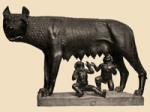 As for the human mind, I’ve often thought about the metaphor of the museum.
As for the human mind, I’ve often thought about the metaphor of the museum.
Our mind, one of the functions of our brain ‘and other parts of our body’ (Sledpress’ objection I found interesting,) contains and allows that we manifest the infinite traces of our past (past conceptions, language, behaviours) from Stone Age or earlier onwards. Evolution enters the equation, but we will leave it alone for now.
Whatever world region we are from, we should be concerned about probing such repository I believe, that is our roots or cultural ID.
Language is an important portion of this ID. What a great digging tool for example etymology is, ie history of words (shown a bit in our previous post, see a good on-line tool) although lots of things are there well beyond words (see points I and IV below.)
Ψ
A few examples, to better understand.
(Italian-mind related, but they could hopefully work as a method example to different minds as well)
I. The Greek fear in gods’ envy, yet present in South Italy and Greece:
“Not long ago my friend Mario took me for a drive on his stupendous vintage 1960 Lancia Flavia (see image below.) Mario is from Naples, a South Italian city founded by the Greeks in the 8th cent. BCE.
On the way back I exclaimed merrily: ‘Diavolo, this car is a gem, it has rolled as smoothly as olive oil!’
Mario snapped with a worried look: “Hush! hush! Don’t you say that!”
I well knew what he meant:
“Oh please you shut the hell up! Do you want the car to break down or anything bad to happen to us?” as if the mere utterance of happiness would attract ill luck or the envy from someone … Well, the envy from whom?
(read more).
The ancient classical Greeks (V cent. BCE) believed their gods lived an eternal blissful life and envied men too prosperous that dared to get close to their happiness. They then humbled and punished them. That ‘too prosperous’ means it was excess and arrogance (ὕβρις) that was basically abhorred by the Olympian gods, which made people afraid of showing their happiness, or of being arrogant. It was like a socio-religious regulation valve, plus a factor without a doubt of the mostly upper-class (tho not exclusively) marvellous ‘5th cent. BC’ Greek perfect equilibrium.

Polycrates tyrant of Samos (where Pythagoras was born by the way) led a too prosperous and arrogant life. Horrible was then his death, Herodotus notes
Now, 2400 years later (!) people in Southern Italy and Greece are still afraid of expressing satisfaction when things are going WELL, lest ‘something’ might spot them and whack them.
Such a great item in their museum mind allow me to say!!
II. Phrases and the Wheel related to the Roman Goddess Fortuna:
- A personification of Goddess Fortuna (“they invoked their fortune”) seen as something capricious (“the tricks of fortune”) is deeply impressed in modern Western minds and language;
- The wheel of fortune also used in many popular TV shows is a survival of the goddess, often represented with a wheel at her side (read more)

Spectacular remnants of the Sanctuary to the goddess Fortuna Primigenia in Palestrina (ancient Praeneste), located just a few miles from Rome
III. When we say ‘deep in my heart‘ or ‘she / he broke my heart’ we refer to a scientific superseded idea that the heart, and not the brain, is the seat of emotions. The Stoics saw in the heart the seat of the soul, Aristotle the seat of reason and emotion, the Roman physician Galenus the seat of emotions etc.
IV. The Roman laughter
“Flavia’s ancient Roman laughter is heard in the room. It is loud, slightly crass, as it should be and as I hope it will ever ever be in the future, somewhat like a sympathetic, warm BIG HUG to the world.”
(from How To Learn Greek and Latin (2). Some Inspiration From Penates etc)
Another great mind item this laughter – I must record it some day – that belongs to the modern Roman mind, certainly not to the Greek one, modern or non modern.
Update. Here is a sample of such laughter. Click on these words to listen to it: Marina’s (and MoR’s) laughter.
In short, before more details if you will
There’s like a huge messy archive in our head so stuffed with things that just beg to be organized a bit and come to light.
Let’s get it all out dear readers. With meditation, concentration and fertile idea-exchanging let us make that inventory my good old Mentor used to mention us when we were so young.
As for my own cultural ID, I am trying to dig a bit with the present blog.
Ψ
[see in-depth details from our posts. Skip the first section – similar to the above writing – and start reading from Socrates’ T-shirt big face onwards – like the one above]
Related posts:
Fighting with Grandpa’s tomes. My Parents’ Marriage & the Roman Laughter








